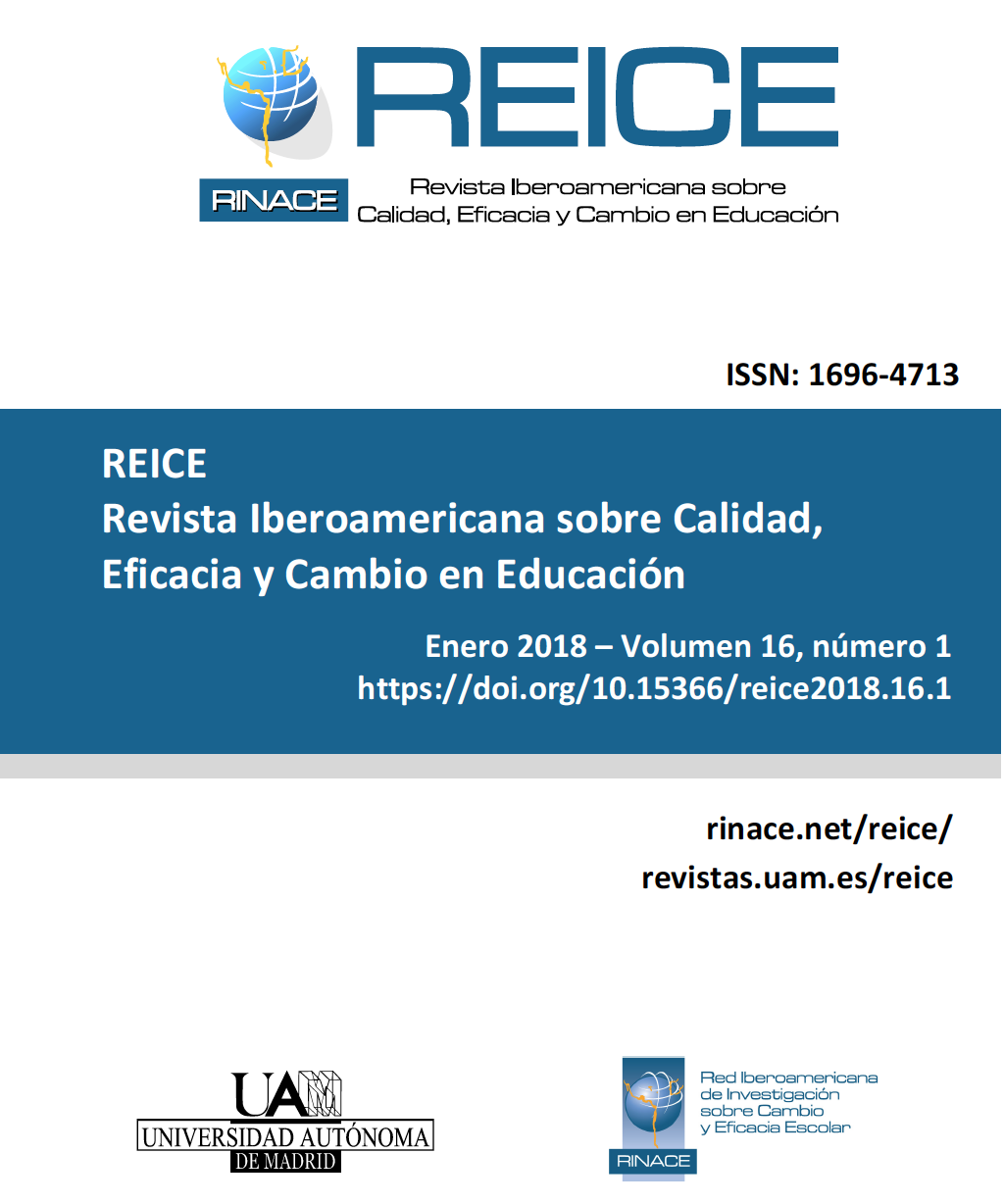The Leadership for School Improvement and Social Justice. A case Study in Secondary Education School
Keywords:
Leadership, School principal, Improvement, Social justice, School.Abstract
This research is a case study of a compulsory secondary education center, the same objective is pursued as the project of which it is part that is: to know the successful practices of leadership for the improvement of academic results. The case study has been used as a methodology and the interview and the review of documents as research instruments. The results obtained are focused on highlighting the characteristics and successful leadership strategies to achieve good academic results. The results indicate that the director develops a distributed and participative leadership, underlining the characteristics related to his character, training, capacity for improvement, of developing a favorable environment towards work both for students and teachers, to share a clear vision and to do this, work in a joint way with the educational community (students, teachers, families, etc.). The conclusions obtained are related to the results of the isspp project, related to: the personalization of the learning experience, the collaborative work of the teachers, the feedback of the educational community for the improvement of the school, among others.
Downloads
References
AGAVE. (2014). Indicadores homologados para la autoevaluación de centros que imparten educación secundaria. Sevilla: Consejería de Educación, Cultura y Deporte.
Bardín, L. (2002). Análisis de contenido. Madrid: Akal.
Beauchamp, L. y Parsons, J. (2014). Liderazgo instructivo en Alberta: Hallazgos de la investigación en cinco escuelas altamente eficaces. REICE. Revista Iberoamericana sobre Calidad, Eficacia y Cambio en Educación, 12(4e), 89-98.
Bolívar, A. (2010). Liderazgo para el aprendizaje. Organización y gestión educativa. Revista del Fórum Europeo de Administradores de la Educación, 7(1), 1-6.
Bolívar, A. (2014). Building school capacity: Shared leadership and professional learning communities. A research proposal. International Journal of Educational Leadership and Management, 2(2), 147-175.
Cohen, L. y Manión, L. (1990). Métodos de investigación educativa. Madrid: La Muralla.
Day, C. (2015). International successful school principals project (ISSPP): Multi-perspective research on school principals. Nottingham: University of Nottingham.
Day, C. Harris, A. Hadfield M. Tolley, H. y Beresford, J. (2000). Leading schools in times of change. Milton Keynes: Open University Press.
Day, C., Sammons, P., Hopkins, D., Harris, A., Leithwood, K., Gu, Q. y Brown, E. (2010). 10 strong claims about successful school leadership. Nottingham: National College for Teaching and Leadership
Day, C., Sammons, P., Leithwood, K., Hopkins, D., Gu, Q., Brown, E. y Ahtaridou, E. (2011). Successful school leadership: Linking with learning and achievement. Maidenhead: McGraw Hill Open University Press.
Gronn, P. (2002). Distributed leadership. En K. Leithwood y P. Halliger (Eds.). Second international handbook of educational leadership and administration (pp. 653–696). Dordrecht: Kluwer Academic Publishers. https://doi.org/10.1007/978-94-010-0375-9_23
Hallinger, P. y Heck R. H. (2014). Liderazgo colaborativo y mejora escolar: Comprendiendo el impacto sobre la capacidad de la escuela y el aprendizaje de los estudiantes. REICE. Revista Iberoamericana sobre Calidad, Eficacia y Cambio en Educación, 12(4e), 71-88.
Harris, A. (2009). Distributed leadership: What we know? En A. Harris (Ed.), Distributed leaders. Different perspectives (pp. 11–25). Londres: Springer. https://doi.org/10.1007/978-1-4020-9737-9
Hopkins, D. (2013). Exploding the myths of school reform. Victoria: Centre for Strategic Education.
Hopkins, D., Ainscow, M. y West, M. (1994). School improvement in an era of change. Londres: EPPI.
Leithwood, K. y Riehl, C. (2009) ¿Qué sabemos sobre el liderazgo educativo? En K. Leithwood (Coord.), ¿Cómo liderar nuestras escuelas? Aportes desde la investigación (pp.17-34). Santiago de Chile: Área de Educación Fundación Chile.
Leithwood, K., Day, C., Sammons, P., Harris, A. y Hopkins, D. (2006). Seven strong claims about successful school leadership. Nottingham: National College of School Leadership.
Leithwood, K., Harris, A. y Hopkins, D. (2008) Seven strong claims about successful school leadership. School Leadership & Management, 28(1), 27-42. https://doi.org/10.1080/13632430701800060
Minor-Ragan, Y. y Jacobson, S. (2014). USA-Her own words: Turning around an under performing school. En C. Day y D. Gurr (Eds.), Leading school successfully. Stories from the field (pp. 9–18). Londres: Routledge.
Murillo, J. y Hernández-Castilla, R. (2014). Liderando escuelas justas para la justicia social. Revista Internacional de Educación para la Justicia Social (RIEJS), 3(2), 13-32.
Pascual, J., Larraguibel, D., Zenteno, D. y Guarda, F. (2016). Liderazgo escolar en tiempos de crisis. el caso de dos liceos del centro sur de Chile después del 27F. REICE. Revista Iberoamericana sobre Calidad, Eficacia y Cambio en Educación, 14(2), 45-62.
Spillane, J. (2013). The practice of leading and managing teaching in educational organisations. En OECD-Center for Educational Research and Innovation (Ed.), Leadership for 21st century learning (pp. 59–82). Barcelona: Fundació Jaume Bofill.
Spillane, J., Camburn, E. y Pareja, A. (2007). Taking distributed perspective to the school principal’s workday. Leadership and Policy in Schools, 6, 103-125. https://doi.org/10.1080/15700760601091200
Spillane, J., Halverson, R., y Diamond, J. (2004). Towards a theory of leadership practice: A distributed perspective. Journal of Curriculum Studies, 36, 3-34. https://doi.org/10.1080/0022027032000106726
Stoll, L. y Fink, D. (1998). The cruising school: The unidentified ineffective school. En L. Stoll (Ed.), No quick fixes: Perspectives on schools in difficulty (pp. 189-206). Londres: Falmer Press.
Wahistrom, K. L. y Louis, K. (2008). How teachers experience principal leadership: The roles of professional community, trust, efficacy, and shared responsibility. Educational Administration Quarterly, 44, 458-495. https://doi.org/10.1177/0013161X08321502
Walker, A. D., Lee, M. y Bryant, D. A. (2015). How much of a difference do principals make? An analysis of beetwenschools variation in academic achievement in Hong Kong public secondary schools. School Effectiveness and School Improvement, 25, 602-628. https://doi.org/10.1080/09243453.2013.875044
